|
|
|
Sort Order |
|
|
|
Items / Page
|
|
|
|
|
|
|
| Srl | Item |
| 1 |
ID:
159858
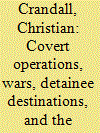

|
|
|
|
|
| Summary/Abstract |
We explore US covert forcible actions against democratic governments and their citizens and show that interdemocratic use of covert force is common and can be accommodated within the theory of democratic peace. Grounded in the Perceptual Theory of Legitimacy, we argue that democracies are constrained by public perceptions of their legitimacy from overtly aggressing against other democratic states. When democracies desire to aggress against their democratic counterparts, they will do so covertly. We test the assumptions of the theory and its implication with (1) laboratory studies of the conflation of democracy with ally status and (2) historical analyses of covert militarized actions and prisoner detention, which show that US forcible actions, when carried out against democracies and their citizens, are carried out clandestinely.
|
|
|
|
|
|
|
|
|
|
|
|
|
|
|
|
| 2 |
ID:
159865
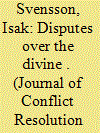

|
|
|
|
|
| Summary/Abstract |
This article introduces the Religion and Armed Conflict (RELAC) data, 1975 to 2015, which is a new data set suitable for analyzing the causes, dynamics, and resolution of religious conflicts. It contains information about key religious dimensions of conflicts: whether the issue at stake is religious, the actors’ religious identity, and fine-grained data about the type and salience of religious claims. The article presents the major features of the data set and describes patterns and trends that shed new light on religious conflicts, for example, by demonstrating that conflicts over Islamist claims have become more prevalent. We also illustrate the utility of the data. For instance, we show that there is great variation in lethality across conflicts with different types of Islamist claims, thereby offering a more nuanced understanding of the deadliness of religious conflicts. RELAC should be a valuable resource for scholars, examining religious dimensions of intrastate armed conflicts.
|
|
|
|
|
|
|
|
|
|
|
|
|
|
|
|
| 3 |
ID:
159863


|
|
|
|
|
| Summary/Abstract |
Political economy debates about the influence of power configurations in expanding and maintaining global liberalization ebb and flow with the wax and wane of the concentration of power in the international system. This article engages the debate in a novel way from previous scholarship. Employing a series of econometric models that account for regional power, I argue that the global power concentration is ill fit to be the primary predictor of trade liberalization, but instead, regional power fluctuations can dampen and enhance global trends. By incorporating subsystemic power configurations, we gain a better understanding of the regional variation in states buying into or cashing out of interdependence.
|
|
|
|
|
|
|
|
|
|
|
|
|
|
|
|
| 4 |
ID:
159862
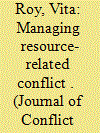

|
|
|
|
|
| Summary/Abstract |
States endowed with valuable lootable natural resources tend to experience longer armed conflicts, more intense fighting in extractive regions and face a higher risk of recurring conflict than states without such resources. At the same time, many states defy resource-fueled conflict traps and set up institutional arrangements that seem to alleviate the risk of recurring conflict. However, policy makers and academics alike lack a sound understanding of the link between postconflict stabilization and strategies of resource management that often escape the paradigm of “good resource governance.” This article contributes to the questions of how to conceptualize diverse institutional arrangements in the resource sector and how to link these emerging institutions to postconflict stabilization. I develop a theoretical framework that predicts the risk of recurring armed conflict based on lootable resource management strategies and conditioning factors. The framework is then tested on a unique event history dataset. Results support the stabilizing effects of inclusive and publicly accountable modes of resource management as advocated for by proponents of “good resource governance.” Alternative resource management strategies either increase the risk of conflict recurrence or interact with other variables, changing the prospects of postconflict stability in important ways
|
|
|
|
|
|
|
|
|
|
|
|
|
|
|
|
| 5 |
ID:
159857
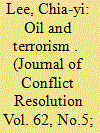

|
|
|
|
|
| Summary/Abstract |
Is there an association between oil and terrorism? If so, how are they linked to each other? While there are literature and anecdotes about oil money financing terrorism, this article identifies three mechanisms through which oil is linked to terrorism: funding, targeting, and motivating. Oil-producing countries are prone to terrorism because they are important targets of terrorists who may attack oil facilities to cause greater impact and to harm powerful countries’ overseas interests and also because oil often generates grievances or greed among local people who may in turn engage in terrorist activities. Using data on terrorist incidents and oil income, this article finds a strong, positive relationship between oil and terrorism. To test the mechanisms, this article uses both large-N and small-N data analyses, and the findings suggest that while all three mechanisms appear to explain the oil–terrorism linkage, the targeting and motivating mechanisms are more likely than the funding mechanism. Oil-producing countries have a higher tendency to sponsor terrorism, but no direct evidence indicates oil money flowing to terrorists except for money from kidnapping or extorting oil workers.
|
|
|
|
|
|
|
|
|
|
|
|
|
|
|
|
| 6 |
ID:
159864
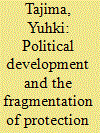

|
|
|
|
|
| Summary/Abstract |
Why do gangs proliferate during democratization and decline in number during authoritarian consolidation? I utilize primary evidence of two Indonesian gangs to inform a model of protection gangs under varying states of political development. Modeling gangs as territorial firms under different regulatory conditions, I attribute their number and political affiliation to the interaction between state capacity and political fragmentation. In weak states, gangs will lack political affiliations and their number will be determined by the scalability of their coercive capacities. In countries where states have the capacity to significantly constrain gangs, but lack significant costs for politicians to associate with them, gangs will seek political affiliation, trading coercive services for lax law enforcement. In such contexts, their number will be determined by state factionalization. Thus, gangs proliferate during democratization due to more political actors sharing state control. I assess the theory examining Indonesia’s history of statebuilding and political transition.
|
|
|
|
|
|
|
|
|
|
|
|
|
|
|
|
| 7 |
ID:
159859
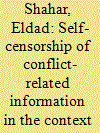

|
|
|
|
|
| Summary/Abstract |
Self-censorship is of great importance in societies involved in intractable conflict. In this context, it blocks information that may contradict the dominant conflict-supporting narratives. Thus, self-censorship often serves as an effective societal mechanism that prevents free flow and transparency of information regarding the conflict and therefore can be seen as a barrier for a peacemaking process. In an attempt to understand the potential effect of different factors on participants’ willingness to self-censor (WSC) conflict-related information, we conducted three experimental studies in the context of the Israeli–Palestinian conflict. Study 1 revealed that perception of distance from potential information recipients and their disseminating capabilities lead to higher WSC. Study 2 replicated these results and also showed that fulfilling different social roles has an effect on the WSC. Finally, study 3 revealed that the type of information has a major effect on WSC.
|
|
|
|
|
|
|
|
|
|
|
|
|
|
|
|
| 8 |
ID:
159861


|
|
|
|
|
| Summary/Abstract |
We collect experimental evidence on a modified version of the standard ultimatum game in which the responder states an acceptance threshold below which the offer is rejected and both players, proposer and responder, are allowed several attempts to reach an agreement by conceding. Proposers concede by increasing offers and responders concede by decreasing acceptance thresholds. Treatments differ in whether a further attempt requires that at least one party should have conceded. A further condition varies the number of possible negotiating attempts, namely, 3 versus 5. Behavior in the lab diverges significantly from the theoretical solution in which the proposer is expected to get nearly the whole pie in each treatment. Proposers (responders) initially offer less (ask more) and concede more across negotiation attempts in the treatment in which concessions are required. Moreover, compulsory concessions weaken the bargaining position of the proposer, who eventually gets significantly less. Finally, although concessions significantly improve the likelihood of an agreement compared to standard ultimatum game experiments, the longer negotiation horizon (five attempts instead of three) delays the agreement without enhancing it, even when no concessions are needed.
|
|
|
|
|
|
|
|
|
|
|
|
|
|
|
|
| 9 |
ID:
159860


|
|
|
|
|
| Summary/Abstract |
Public opinion in postconflict societies toward international missions is widely believed to be important. We offer a theory that local satisfaction critically depends on an individual’s perception of whether the mission is furthering the wartime political agenda of his or her social group. To test this theory and competing hypotheses, we examine Kosovo Albanian satisfaction with the United Nations Mission in Kosovo (UNMIK). We use data from seventeen different representative surveys conducted in Kosovo from 2002 to 2007 as well as focus group and other primary and secondary sources. Consistent with our theory, we find that aggregate satisfaction over time reflected UNMIK’s growing acceptance of Kosovo’s independence and individuals with more radical views tended to be less satisfied with UNMIK. Our analysis implies that missions can achieve greater local satisfaction by doing what is possible to be responsive to, or at a minimum recognize, the wartime political agendas of the key social groups.
|
|
|
|
|
|
|
|
|
|
|
|
|
|
|
|
|
|
|
|
|